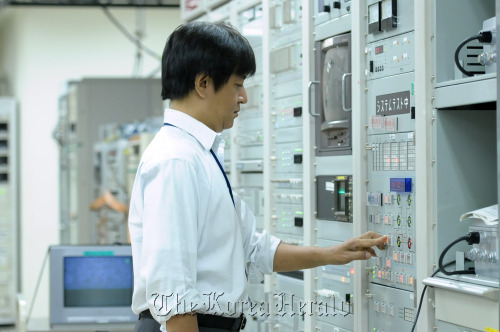Japan ended a 58-year era of analog television broadcast Sunday, becoming the first Asian nation to complete the transition to digital transmission.
Cathode-ray tube TVs, usually with a curved screen and a protruding box at the back, could no longer display programs without adding a special tuner after the switchover Sunday afternoon. Public broadcaster NHK news and Pocket Monsters cartoon series were among the popular shows that shifted completely to digital beaming.
Cathode-ray tube TVs, usually with a curved screen and a protruding box at the back, could no longer display programs without adding a special tuner after the switchover Sunday afternoon. Public broadcaster NHK news and Pocket Monsters cartoon series were among the popular shows that shifted completely to digital beaming.

The switch by Japan, which follows similar moves by the U.S. and Germany in the past three years, frees up air waves that may later be allocated to mobile-phone operators such as Softbank Corp. who want to improve service. With more than 90 percent of Japanese households already owning flat-screen TVs, some purchased with recent incentives, the switchover may damp sales of new sets.
“Consumers, who were forced to replace their TVs because of a policy won’t likely have a motivation to buy another one for a while,” said Koki Shiraishi, an analyst at Daiwa Securities Capital Markets Co. Of the more than 100 million TV sets in Japan, about 60 million to 70 million have been replaced in the past four years because of the transition, he said.
South Korea, the U.K. and France are also planning to switch off analog systems to allow for other uses of the radio spectrum, according to a December research by Japan’s Ministry of Internal Affairs and Communications. (Bloomberg)
Shrinking Domestic Market
Japan announced its plan to completely shift to the more efficient digital technology in 1998, saying consumers would be able to enjoy better-quality pictures and services such as weather forecasts and baseball player profiles on screen. Recording a week of program can be done more easily with digital TVs and subtitles for people with hearing problems.
Pictures and sound information were encoded and sent in analog signals since the birth of cathode-ray tube TVs.
While the transition gives opportunities for mobile-phone operators, declining demand for flat-panel TVs will likely hurt some TV makers that rely on their home market, said Ichiro Michikoshi, an analyst at Tokyo-based BCN Inc.
“With domestic market shrinking, there should be a reshuffle among Japanese TV makers,” said Michikoshi. “TV makers will have to go abroad.”
Sales of TVs in Japan may tumble 44 percent this year, and 47 percent next year after jumping 63 percent to a record $13.2 billion in 2010, researcher DisplaySearch forecast in May.
Sharp Corp., the top TV seller in Japan, sells 56 percent of its TVs at home, according to DisplaySearch.
Sharp, Panasonic
Panasonic Corp., the nation’s largest appliance maker, sold 41 percent of its sets in Japan, the researcher said. The Osaka- based maker of Viera televisions may report an annual loss at its TV unit in the year started April 1, Chief Financial Officer Makoto Uenoyama said last month.
Sharp, the biggest seller of TVs in Japan, forecast revenue from its LCD sets will decline 15 percent to 680 billion yen globally in the current fiscal year. The company had turned the TV operation profitable in the year ended March 31.
Sales of TVs more than doubled during the fourth week of June, according to GfK Marketing Services Japan Ltd., as consumers rushed to replace older conventional models that can’t receive digital signals.
Japan’s digital broadcasting will take up only two thirds of radio bands used by analog system, according to a government statement in January. The government plans to use the freed spectrum to improve mobile phone services, traffic information services, disaster preventative measures and a new business of broadcasting exclusively for mobile gadgets.
Mmbi, Inc., a venture set by a group of Japanese companies led by NTT DoCoMo Inc., Japan’s largest mobile-phone carrier, won the only slot to offer multimedia broadcasting for mobile phone users in September last year, beating another group led by KDDI Corp., the nation’s No. 2 mobile-phone operator.
Softbank, the exclusive provider of Apple Inc.’s iPhone in Japan, is seeking a government approval to use part of the spectrum freed by analog broadcast to improve its data transmission. The company’s plan to spend 1 trillion yen ($13 billion) in the two years from April 1 is based on an expectation it will get some spectrum allocation, President Masayoshi Son said May 9.
(Bloomberg)
















![[KH Explains] Hyundai's full hybrid edge to pay off amid slow transition to pure EVs](http://res.heraldm.com/phpwas/restmb_idxmake.php?idx=652&simg=/content/image/2024/04/18/20240418050645_0.jpg&u=20240418181020)

![[Today’s K-pop] Zico drops snippet of collaboration with Jennie](http://res.heraldm.com/phpwas/restmb_idxmake.php?idx=642&simg=/content/image/2024/04/18/20240418050702_0.jpg&u=)